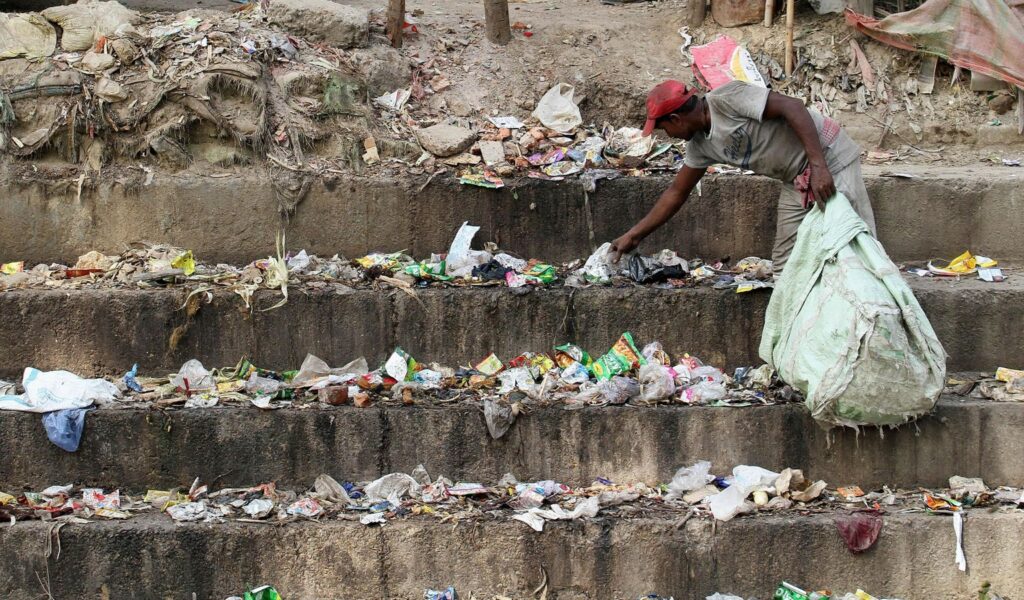This column is co-authored with my colleague, Ellen Martin, our Chief Impact Officer, who is leading the integration of responsible supply chain management throughout every facet of Circulate Capital’s investment approach, from sourcing and due diligence to portfolio management. A driving force behind these initiatives, Ellen has led the creation of a pioneering roadmap, engaging our team, portfolio companies and LPs. In this piece, she shares unique insights about why investors need to widen apertures to incorporate responsible sourcing as part of building a sustainable circular economy.
From the early days of identifying solutions to fight ocean plastic, we knew that we would only achieve success when we stopped thinking about this as only an environmental crisis and considered the people involved. Ending plastic pollution and developing a circular economy has clear climate benefits, but we also need to mitigate risks around human rights and improve workers’ livelihoods. If we do it right, this work can be an engine for economic prosperity and a just transition.
The scale and nature of informal waste work
Waste management could be one of the world’s oldest professions. This is because waste has long-held economic opportunity; as the saying goes, “One man’s trash is another man’s treasure.” Informal waste workers, or waste pickers as they are often known, are a critical contributor to plastics recycling in emerging markets. Where infrastructure does not yet exist, if any material is being recovered, it’s being collected by waste pickers. Globally, an estimated 58% of plastics collected for recycling are collected by the informal sector.
For an estimated 15 million people around the world, recovering material for recycling is the primary way of earning a living in an informal economy. This work is not easy, and it is often taken up by those at the margins of society, including migrants and women. They are also vulnerable to exploitation, exposed to harsh working conditions, and deprived of social and human rights protections. Their families and children can be affected, too. These unjust practices often continue unseen, as others further down the formal supply chain are far removed from the informal system and its lack of transparency or traceability. In some communities, cultural norms around waste pickers are deeply ingrained over generations, making it challenging to adopt contemporary labor standards.
As the formal recycling sector grows — with the help of private investment — informal waste workers in the supply chain should also benefit. Access to quality feedstock can mean opportunities for increased incomes and improved work environments. In the coming years, millions of tons of new capacity for recycling infrastructure will be built, meaning that we have the potential to also positively impact livelihoods at a massive scale at the same time.
With so much effort being placed on increasing the scale of circular solutions, we, as investors, must anticipate the risks and potential for impact associated with our investments. Ignoring the millions of individuals so critical to the system will undoubtedly put investment returns and intended impact at risk. What Circulate Capital has learned from the markets we invest in in South and Southeast Asia is that by investing in socially responsible models, we are not just doing the right thing. We are also better able to de-risk investments while building more robust, scalable businesses.
What does investing in a socially responsible supply chain look like?
We are gaining a clearer picture of the models and practices that lead to the most significant impact on the ground. There’s more to learn, but these four insights have helped us on our journey.
- Create opportunities for informal waste workers in the scale-up of recycling infrastructure and businesses. Lucro, a flexible film recycler in India, has vertically integrated, established a digitized payment system, and set up its own collection centers to cut out the middlemen, improve traceability, and offer better pricing for materials historically sold for low value. With more centers planned across India as they scale, they are creating new infrastructure that has an exponential impact on the number of waste pickers they can reach and support.
- Build a tailored and bottoms-up approach to supply chain compliance. It’s not practical or beneficial to assume worker safety, for example, will look the same for a waste picker in the streets of Jakarta as it does in a garment factory in Bangladesh. Mr. Green Africa, the Nairobi based pioneering plastic recycling company that became the first Certified B Corporation on the African continent, recognized that the mere donation of PPE and imposing its use on waste pickers would not yield effective results. As a consequence, the company has shifted its focus to raise awareness and provide targeted training to garner the buy-in of waste pickers, encouraging them to willingly wear the PPE rather than opting to sell it for cash.
- Prioritize transparency and traceability by building trust. Despite the many technical solutions coming online that promise total traceability in the supply chain, successful adoption and use by formal and informal suppliers require active engagement and trust. Dalmia, a PET recycler in India, has built its own traceability software and app. It has been rolling it out alongside a supplier development program that will incentivize the adoption of responsible practices across a network of more than 70 suppliers, with an estimated 700 tier 2 suppliers. The company has taken time to work one-on-one with many of these suppliers to ensure that the trust built over their longstanding relationships is sustained as the company shifts to increased traceability. Providing support and incentives further demonstrates Dalmia’s commitment to these supplier relationships.
- Engage with all actors across the supply chain. Protecting human rights across the plastics recycling value chain is a complex systemic challenge. Fortunately, we are already seeing momentum on this issue from different actors in the ecosystem, including:
- Multinationals, who are increasingly recognizing that responsible sourcing is critical for business and adopting their own standards, policies, and procurement practices. This has a ripple effect throughout the recycling supply chain.
- Recycling businesses, which are changing practices, but these will be limited without additional support and incentives.
- Regulators and policymakers, who are talking about a just transition for waste workers, with proposals emerging for how such terminology should be implemented in practice.
- Advocates and civil society organizations, which are playing an essential role in helping shape policy debates and keep workers at the center of these important decisions.
- Investors, who are increasingly aware of the opportunity to improve impact and financial returns by addressing social risk, with development finance institutions at the forefront. With support from the likes of PROPARCO and IFC, fund managers such as Circulate Capital are seeing opportunities to accelerate the investability of the sector by building better, more inclusive models that drive a circular economy for plastics and ensure informal waste workers are clear winners in the just transition.
More examples are shared in “Responsible Sourcing in the Plastic Waste and Recycling Sector,” a report published recently by our non-profit partner, The Circulate Initiative. Such models are not only sustainable but are, in fact, more competitive because they can reduce cost, increase traceability, and improve the consistency and quality of their supply. At the same time, they create opportunities to strengthen the practices of upstream suppliers as well.
So, the real takeaway for investors is that incorporating a focus on socially responsible supply chain management is more than just the right thing to do. It’s good for business. To reduce the drag that social factors can have on financial and impact returns, investors need to push asset managers and other investors for more comprehensive investment strategies that include gaining an understanding of who is actually impacted, how to mitigate the associated risks, and how to use capital to improve livelihoods. The failure to do so can present tremendous risks to businesses from a social and regulatory point of view and result in missed opportunities to build a resilient, vibrant, and investible supply chain.
Read the full article here









